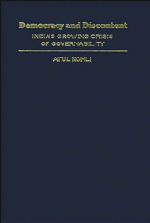Book contents
- Frontmatter
- Contents
- List of tables and figures
- Preface and acknowledgments
- PART I INTRODUCTION
- PART II THE GROWING PROBLEMS OF GOVERNING THE PERIPHERY: POLITICS IN THE DISTRICTS
- Introduction: the districts
- 3 Kheda, Gujarat
- 4 Guntur, Andhra Pradesh
- 5 Belgaun, Karnataka
- 6 Calcutta, West Bengal
- 7 Madurai, Tamil Nadu
- Conclusion: the districts
- PART III ORDER AND BREAKDOWN IN THE STATES
- PART IV CENTRALIZATION AND POWERLESSNESS AT THE CENTER
- PART V FINAL INFERENCES
- Bibliography
- Index
Introduction: the districts
Published online by Cambridge University Press: 05 June 2012
- Frontmatter
- Contents
- List of tables and figures
- Preface and acknowledgments
- PART I INTRODUCTION
- PART II THE GROWING PROBLEMS OF GOVERNING THE PERIPHERY: POLITICS IN THE DISTRICTS
- Introduction: the districts
- 3 Kheda, Gujarat
- 4 Guntur, Andhra Pradesh
- 5 Belgaun, Karnataka
- 6 Calcutta, West Bengal
- 7 Madurai, Tamil Nadu
- Conclusion: the districts
- PART III ORDER AND BREAKDOWN IN THE STATES
- PART IV CENTRALIZATION AND POWERLESSNESS AT THE CENTER
- PART V FINAL INFERENCES
- Bibliography
- Index
Summary
Chapters 3–7 analyze political change at India's political periphery, away from the main centers of power. In order to get a sense of how the practice of local politics has changed over time, the five districts analyzed here are the same ones that were investigated in the early 1960s by Myron Weiner in his well-known and insightful book Party Building in a New Nation: The Indian National Congress.
The central analytical problem for Weiner was to explain how the Congress party had transformed itself from a nationalist movement into a legitimate and powerful ruling party. Pointing to several factors, Weiner emphasized the adaptive quality of the Congress party. The party had sought to build alliances with the socially powerful rather than fight against them. That had enabled many Congressites to succeed politically, because those whose opinions carried weight and influence in society had joined or were attracted to the Congress party. The implications of this political strategy for Congress's role in facilitating socioeconomic transformation probably were negative. What was clear, however, was that the Congress party had built a relatively legitimate authority structure. That structure used patronage networks anchored by local notables – the landed, the wealthy, the panchayat (local government) leaders, the heads of local cooperatives, and the caste elites.
Twenty-five years later the analytical problem has changed. During the early 1960s, Congress was the dominant political force in each of the five districts discussed in the following chapters. Today, political power is vigorously contested in all of these districts.
- Type
- Chapter
- Information
- Democracy and DiscontentIndia's Growing Crisis of Governability, pp. 35 - 36Publisher: Cambridge University PressPrint publication year: 1991



